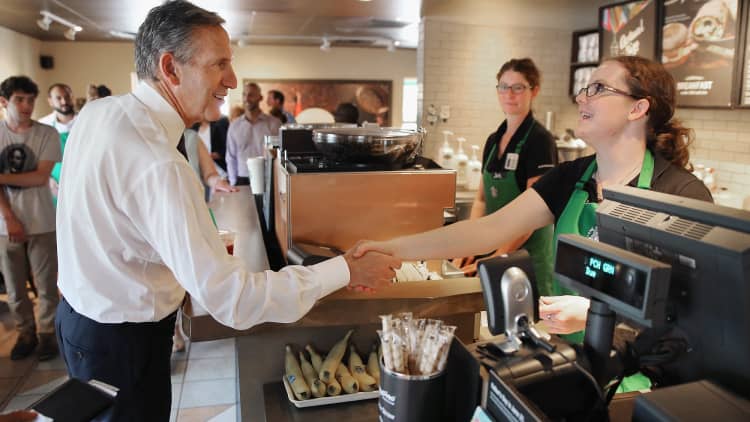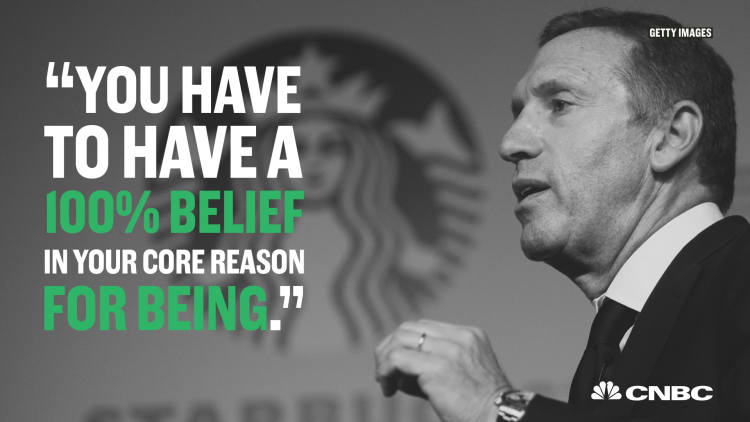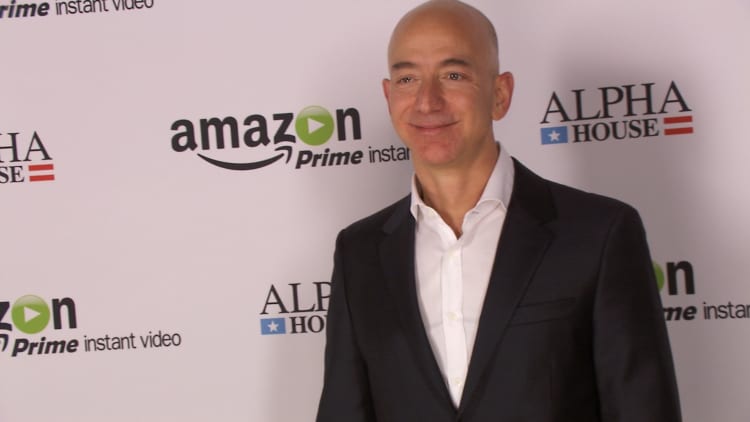Starbucks ex-CEO Howard Schultz says he's seriously considering a run for the White House, and he arguably has the wealth and wherewithal to do so.
After all, he's already had a life of legendary success: In June, Howard Schultz stepped down from his role as executive chairman at Starbucks to become the chairman emeritus, an honorary title. Schultz left his role of CEO in April of 2017 — for the second time. He served as CEO from 1987 to 2000 and then returned to take the helm in 2008. He currently has a net worth of $3.3 billion, according to Forbes.
Schultz' fierce combination of determination and independent thinking, along with his work-ethic have taken him this far.
Humble beginnings
Schultz, 65, was born in Brooklyn, New York, and grew up in federally subsidized housing in hardscrabble Canarsie.
His father Fred never graduated from high school and held a series of blue-collar jobs including truck driver, factory worker and cab driver. He never made more than $20,000 a year, and with three children to feed, Fred was never able to afford to buy a home.
Schultz talks affectionately about his father in his book, "Pour Your Heart Into It: How Starbucks Built a Company One Cup at a Time," saying that Fred was an honest man who worked hard, played ball with his kids on the weekend and loved the Yankees.
But there were other sides to his father. Schultz told "60 Minutes" on Sunday that his father was physically abusive. In his book, Schultz also called him "a beaten man" who "tried to fit into the system, but the system had crushed him. With low self-esteem, he had never been able to climb out of the hole and improve his life."
When his father broke his ankle at work in 1961, Fred couldn't go to work. That meant he didn't get paid. His mother was seven months pregnant at the time and couldn't work either. When bill collectors called, Schultz or his siblings were instructed to pick up the phone and pretend that their parents weren't home.
"Our family had no income, no health insurance, no worker's compensation, nothing to fall back on," writes Schultz.
He didn't know then that he would become a businessman and job-creator, but, he writes, "I knew in my heart that if I was ever in a position where I could make a difference, I wouldn't leave people behind."
I knew in my heart that if I was ever in a position where I could make a difference, I wouldn't leave people behind.Howard SchultzFormer chairman and CEO of Starbucks
Schultz went on to graduate from Northern Michigan University, which he attended on a full football scholarship. He became the first person to graduate college in his family. He writes, "To my parents, I had attained the big prize: a diploma."
Before Starbucks, Schultz worked in sales and marketing at Xerox for three years. He went on to be the Vice President and General Manager of Hammarplast U.S.A., a Swedish housewares company.
Rising through the ranks
Schultz moved from New York to Seattle to join Starbucks in 1982 as director of operations and marketing. Back then, the company only had four stores.
In 1983, Schulz traveled to Italy, where he admired the way the espresso bars in Milan serve as a place for people to meet and share time together outside of the home or the office. He left Starbucks and started his own company, Il Giornale coffeehouses.

In 1987, Schultz returned to Starbucks to buy the coffee shop with the help of a few investors. He also took over as CEO. At that point, there were 17 store locations.
Schultz navigated the company through tremendous growth while remaining socially conscious. In 1988, Schultz made a commitment to offer health insurance to eligible full- and part-time workers, including all domestic partners of employees. In 1991, Starbucks started offering "Bean Stock," or company stock, making employees partners in the company.
Of course, he's weathered controversy too. In 2015, Schultz instituted a plan to have baristas write "Race Together" on cups Starbucks coffee cups. "The initiative instead incited derision and outright hostility toward employees and executives. Mr. Schultz ended the initiative within days, saying that he had not expected "universal praise," according to The New York Times.
And in April, when a Philadelphia Starbucks manager called the police on two black men who were waiting to start a business meeting and use the bathroom but had not bought anything, Starbucks was widely criticized. As a result, Schultz later closed all of the U.S. Starbucks store locations for racial bias training. "We had a moral obligation as a company to discuss this," Schultz told CBS' "60 Minutes."
Today, there are almost Starbucks locations in 77 countries and more than 350,000 people work at the coffee company.
A leading voice
Schultz is gracious in deflecting the spotlight.
"Starbucks has been in business now for 45-plus years. You know, I'm not putting myself in the class of Tom Brady or any other athlete that has been at the cornerstone of success on a team sport," Schultz tells CNBC. "This is a team sport. It has always been a team sport. I've gotten more credit that I deserve. The company has a large base of fantastic leaders."
Still, Schultz is largely seen as the smarts behind much of Starbucks' success and its evolution into a global brand.
He has accumulated a stack of awards, including the Distinguished Leadership Award from Northwestern University's Kellogg School of Management, the Horatio Alger Award for those who have overcome adversity to achieve success, the Rev. Theodore M. Hesburgh Award for Business Ethics given by Notre Dame University's Mendoza College of Business, the Botwinick Prize in Business Ethics from Columbia Business School, and the first-ever John Wooden Global Leadership Award from UCLA Anderson School of Management.

He's also a best-selling author. After his first book was well-received, Schultz published "For Love of Country: What Our Veterans Can Teach Us About Citizenship, Heroism, and Sacrifice" (2014) and "Onward: How Starbucks Fought for Its Life without Losing Its Soul" (2011). And his next book, "From the Ground Up: A Journey to Reimagine the Promise of America" was released Monday.
And perhaps soon he will be a presidential candidate.
Schultz's journey involves a bit of luck, he admits, but it has also been the result of a fierce determination and unwavering persistence.
"I willed it to happen," he writes in "Pour Your Heart Into It." "I took my life in my hands, learned from anyone I could, grabbed what opportunity I could, and molded my success step by step."
When Schultz announced his departure from Starbucks, he reflected on his humble beginnings.
"I still feel like a kid from Brooklyn who grew up in public housing," he wrote in June. "I am living the American Dream. And I still have dreams for the company, and for you."
This story was originally published in 2016. It was updated in June 2018 and again on Jan. 28, 2019.
See also:

Like this story? Like CNBC Make It on Facebook


